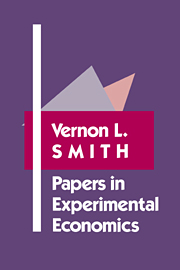Book contents
- Frontmatter
- Contents
- Preface
- Acknowledgments
- Part I The Formative Years
- Part II Institutions and Market Performance
- Introduction
- 10 On Nonbinding Price Controls in a Competitive Market
- 11 An Experimental Comparison of Alternative Rules for Competitive Market Exchange
- 12 Competitive Market Institutions: Double Auctions vs. Sealed Bid-Offer Auctions
- 13 Markets as Economizers of Information: Experimental Examination of the “Hayek Hypothesis”
- 14 The Effect of Rent Asymmetries in Experimental Auction Markets
- 15 Microeconomic Systems as an Experimental Science
- 16 Experimental Economics (Reply to R. Heiner)
- 17 A Comparison of Posted-Offer and Double-Auction Pricing Institutions
- 18 Hypothetical Valuations and Preference Reversals in the Context of Asset Trading
- 19 Bubbles, Crashes, and Endogenous Expectations in Experimental Spot Asset Markets
- Part III Public Goods
- Part IV Auctions and Institutional Design
- PART V Industrial Organization
- Part VI Perspectives on Economics
16 - Experimental Economics (Reply to R. Heiner)
Published online by Cambridge University Press: 06 July 2010
- Frontmatter
- Contents
- Preface
- Acknowledgments
- Part I The Formative Years
- Part II Institutions and Market Performance
- Introduction
- 10 On Nonbinding Price Controls in a Competitive Market
- 11 An Experimental Comparison of Alternative Rules for Competitive Market Exchange
- 12 Competitive Market Institutions: Double Auctions vs. Sealed Bid-Offer Auctions
- 13 Markets as Economizers of Information: Experimental Examination of the “Hayek Hypothesis”
- 14 The Effect of Rent Asymmetries in Experimental Auction Markets
- 15 Microeconomic Systems as an Experimental Science
- 16 Experimental Economics (Reply to R. Heiner)
- 17 A Comparison of Posted-Offer and Double-Auction Pricing Institutions
- 18 Hypothetical Valuations and Preference Reversals in the Context of Asset Trading
- 19 Bubbles, Crashes, and Endogenous Expectations in Experimental Spot Asset Markets
- Part III Public Goods
- Part IV Auctions and Institutional Design
- PART V Industrial Organization
- Part VI Perspectives on Economics
Summary
More than in any particular method of inquiry, I think the hallmark of science is to be found in a constructively skeptical attitude toward knowledge. The more fundamental are the concepts and assumptions of a science, the easier it is to take them for granted and to abandon this skepticism. In this spirit, Ronald Heiner (1985) is correct in emphasizing that the “knowledge” obtained from the study of the performance of experimental markets is only as secure as the classical preference model used to induce prespecified value structures on the agents in such markets. If the purpose of an experiment is to test a theory (for example, supply and demand), and the theory is not “falsified” by the test, this in no way supports any premise of the theory which was also a premise of the experimental design. When we falsify a theory, the implication is that one or more of its assumptions about the behavior of economic agents (maximization of expected utility, commonly shared (homogeneous) expectations, risk aversion, zero subjective costs of transacting, etc.) is in question, and the immediate task is to modify the suspected behavioral assumptions of the original theory. Other assumptions—such as that agents have well-defined preferences, or know the probability distribution from which other agent values were drawn—are not brought into question by the experiment because the experimental design reproduced (or should have) the environment posited by the theory being tested.
- Type
- Chapter
- Information
- Papers in Experimental Economics , pp. 287 - 294Publisher: Cambridge University PressPrint publication year: 1991
- 3
- Cited by



